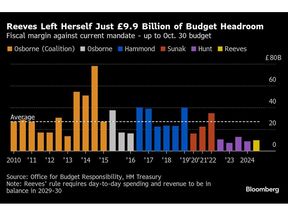Financial institution of England Governor Andrew Bailey does “very strongly agree” with Chancellor of the Exchequer Rachel Reeves’ plans to spice up UK development. His deputy, Clare Lombardelli, can be “very supportive.” They could be, however the central financial institution’s newest forecasts are definitely not.

Article content
(Bloomberg) — Bank of England Governor Andrew Bailey does “very strongly agree” with Chancellor of the Exchequer Rachel Reeves’ plans to boost UK growth. His deputy, Clare Lombardelli, is also “very supportive.” They may well be, but the central bank’s latest forecasts are certainly not.
Article content
Article content
Bailey and Lombardelli, who as deputy governor for monetary policy prepares the quarterly outlook, had little good news for Reeves on Thursday beyond the quarter-point interest rate cut that the Monetary Policy Committee delivered. The BOE halved its growth forecast for this year to 0.75%, estimated a shallow contraction at the end of last year and gave the economy a 2-in-5 chance of already being in a technical recession.
Advertisement 2
Article content material
Dwelling requirements will even take a success, in response to the financial institution. Inflation will likely be a lot stronger than anticipated, largely as a result of higher-than-expected power costs.
The BOE sees the buyer costs index peaking at 3.7% later this yr, an enormous soar from the two.8% it predicted in November. Its survey of companies throughout the nation confirmed that wages would solely match that, at 3.7% in 2025. Actual post-tax take-home earnings will virtually flatline in 2026 and 2027.
The forecasts illustrate the stark problem dealing with Reeves as she makes an attempt to restore Britain’s battered funds and reverse a decline in enterprise sentiment within the wake of her tax-heavy first finances in October. The numbers present how a lot she wants her current blitz of infrastructure and regulatory proposals, together with backing a controversial third runway at Heathrow Airport, to carry the Treasury out its present fiscal squeeze.
Weak development and rising costs over the approaching yr “trace on the threat of stagflation,” Decision Basis Analysis Director James Smith mentioned. “Final week, the chancellor set out her plan to spice up development over the subsequent decade, however the financial institution mentioned it expects to see next-to no development over the approaching months.”
Article content material
Commercial 3
Article content material
Whereas Reeves welcomed the financial institution’s choice to chop its benchmark rate of interest to 4.5%, she acknowledged that she was “not glad” by its financial forecasts. The projections recommend she’ll face one other massive check on March 26, when the Workplace for Finances Accountability is because of launch its twice-annual fiscal replace.
“I’m a really, very robust supporter of the expansion agenda,” the governor mentioned, including that “being dedicated to those reforms and displaying actual indicators they will occur could have a confidence impact.”
Somewhat than supportive phrases, Reeves will want the OBR to include her plans and improve development. If the finances watchdog follows the identical path because the central financial institution and assumes that the UK gained’t develop as quick as was projected in October, Reeves could be liable to breaking her fiscal guidelines. She would then want to chop spending or elevate taxes.
The extent of GDP in 2028-29 determines whether or not she complies together with her self-imposed purpose of paying for presidency spending out of taxes. In October, she had simply £9.9 billion ($12.3 billion) to spare. The OBR has taken what some economists have described as a heroic assumption on productiveness, which underpins much more optimistic forecasts than consensus. The BOE jeopardized that by declaring the UK productiveness has been “destructive” after adjusting for current inhabitants upgrades.
Commercial 4
Article content material
The central financial institution was additionally lower than supportive of Reeves’ £26 billion tax rise on employers within the finances, which its evaluation confirmed weighing on development. Enterprise sentiment has been “weak” and if it persists development might be even worse than anticipated, it warned.
Underlining the dangers to the forecast, the BOE hasn’t accounted for a possible trans-Atlantic commerce warfare, which US President Donald Trump is threatening. Ought to tariffs be imposed, the British financial system could be anticipated to sluggish additional, even when the UK escapes levies by itself items, Bailey mentioned.
To carry productiveness, the BOE hinted that Reeves may have to take selections that will sit uneasily with a Labour authorities. The productiveness slowdown has been most pronounced within the public sector, the place there was a rise in employment however no commensurate improve in output for the reason that pandemic.
The financial institution appeared to take goal on the Nationwide Well being Service, which has been earmarked for a £22.6 billion funding enhance this yr regardless of the federal government pushing aside plans for a significant overhaul. “A number of the weak point may replicate will increase in employment in health-related actions over current years that haven’t been matched by the same improve in measured output,” it mentioned.
Commercial 5
Article content material
Markets gyrated after BOE choice, first pricing in three extra price cuts this yr earlier than paring that again to simply over two. Long run authorities debt was dearer by the tip of the day on fears that inflation might find yourself being sticky.
That meant Reeves didn’t get any assist together with her fiscal house from buyers, and the BOE’s personal forecast for less than two extra price cuts over the subsequent three years is an excellent worse prospect for Reeves’ fiscal headroom.
“The struggle towards inflation will not be over and uncertainty round tariffs on numerous international locations may push up world yields,” BlackRock UK Chief Funding Strategist Vivek Paul mentioned. “We count on additional price cuts this yr however at a measured tempo. We look ahead to the chance of embedded stagflation. The OBR’s forthcoming evaluation of the UK’s funds — and the federal government response — will likely be key.”
—With help from Andrew Atkinson.
Article content material



